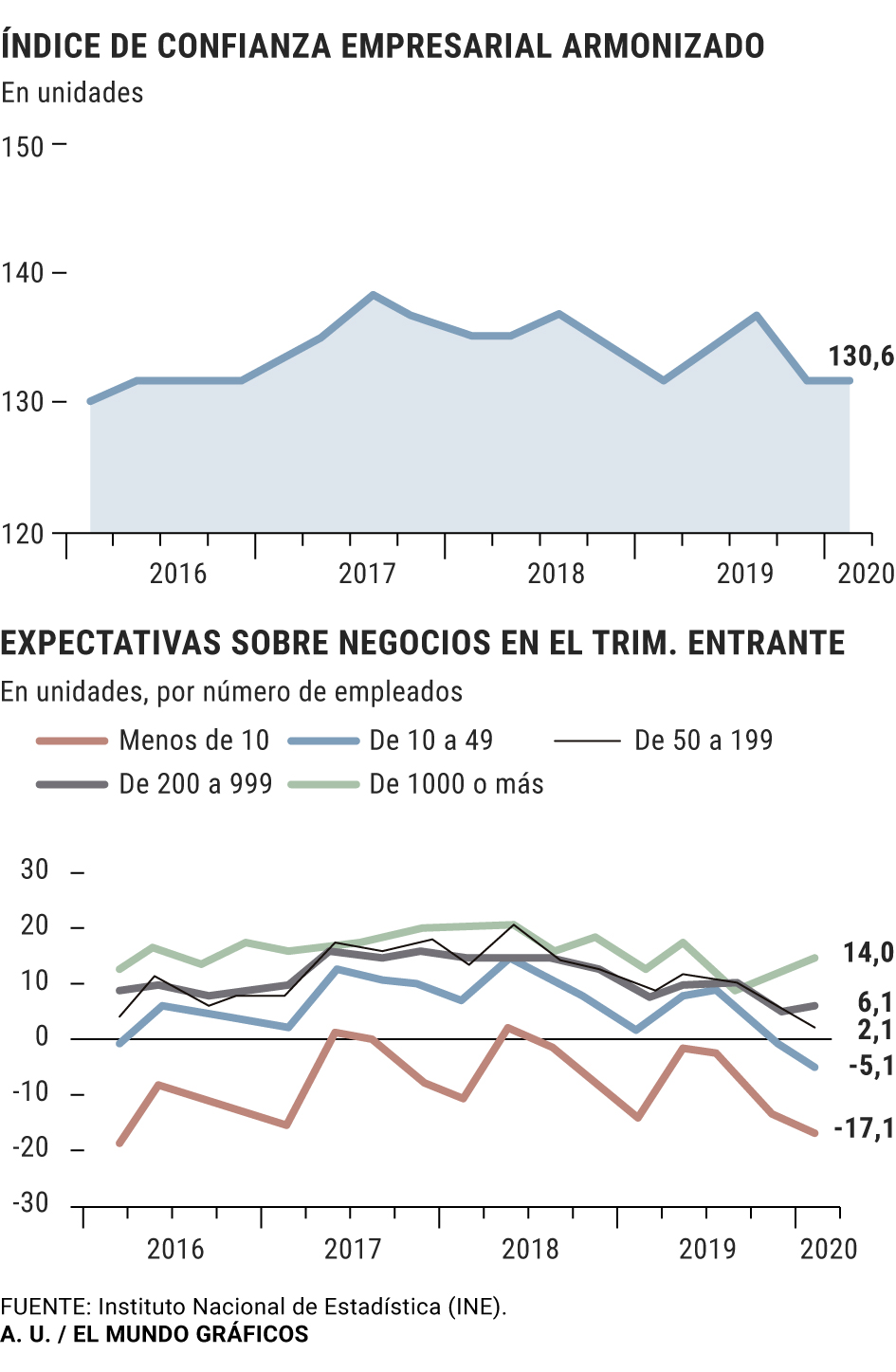Without trust, there is no investment. And at lower investment, lower economic growth. The clouds that fly over the Spanish economy have infected entrepreneurs with greater pessimism about the viability of their companies in the coming months.
The indicator of business confidence published by the National Statistics Institute has receded in the first quarter of 2020 undermined by the sharp worsening of business expectations for these first three months of the year.
The drop has been especially pronounced among smaller companies, that is, those with less than 10 employees on the payroll. In this case, confidence stands at 17.1 negative points compared to the previous quarter, which is the worst figure in the series since the start of 2016.
This data is the result of thousands of surveys conducted by the public body to a heterogeneous base of companies. In these interviews, the company is asked if it believes that its business will behave in a favorable or unfavorable way in the next quarter. If the entire sample answered that it expects positive months on its balance sheet, the result of the indicator would be 100, while if they all believed that they would be negative months, it would be -100.
That is to say, the -17 denotes that there are quite a few smaller entrepreneurs who bet on a brake on their business compared to optimists. The national average that brings together all sectors, sizes and regions is -5.9, also the worst figure in four years, while the indicator improves for companies with more than 500 employees.
By sectors, pessimism is widespread, but it extends mainly between trade and hospitality activities . The fall in business confidence indicators are common at the beginning of the year due to the seasonality of consumption itself. The binge of own expense at the end of the year is always followed by the cost of starting a new year: less shopping, less lunch and dinner outside ...
But in this 2020 the decline in confidence has been especially strong. The global indicator that averages between the expectations of the next quarter and the behavior of the past is 130.6 points, 1.4% less than in the same period of the previous year and 4.1% lower than the maximum recorded in the third quarter of 2018, months after the arrival of Pedro Sánchez to the presidency of the Government.
In this case, to the fear of the businessmen for the economic perspectives of Spain and the Eurozone as a whole, the impact of some of the legislative measures that have already been announced by the new PSOE-Podemos coalition government is added, as explained repeatedly in recent weeks different business employers.
Among these measures are the repeal of the labor reform or the increase in the Minimum Interprofessional Salary. The BBVA study service had an impact last Wednesday when the last rise prevented the creation of 45,000 jobs , while the CEOE and the ATA group of freelancers raise that number and warn of layoffs in areas with less population in the country.
In fact, the greatest pessimism according to INE statistics extends to the regions of Castilla y León, Castilla-La Mancha, Cantabria and the Principality of Asturias. In other autonomous communities such as Madrid, Catalonia or Andalusia with large cities there is even an improvement in business confidence.
The loss of business confidence also occurs in a scenario of economic slowdown in which the main national and international analysts and authorities expect GDP growth to continue reducing this year to around 1.7%. However, in recent weeks, study services such as BBVA or UBS have begun to speak of a re-acceleration as of the next fiscal year driven by the economic recovery of the Eurozone.
According to the criteria of The Trust Project
Know more- INE
- economy
- Macroeconomy
- Unemployment
- Business
- savings and consumption
- Markets
- job
- Catalonia
- We can
- Pedro Sanchez
- PSOE
- Madrid
- Spain
- Castilla la Mancha
- Castile and Leon
- Cantabria
- CEOE
- Andalusia
- minimum salary
Economy A report reflects a "sharp" drop in exports and a 20% unemployment rate in Seville by 2020
EconomyBusiness turnover closes its worst October in 6 years weighed down by the industrial recession
According to INEEspaña, it already grows below 2% after registering its lowest advance in five years

